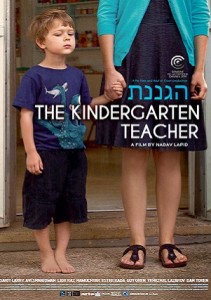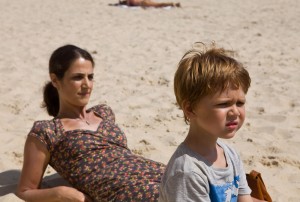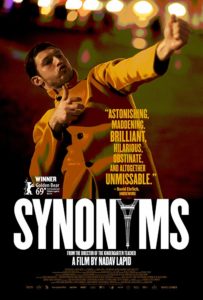With four of his five features playing and winning awards at major film festivals, Nadav Lapid is not only one of the Israel’s most brilliant directors, but also its most provocative one.
Lapid’s new film, Ahed’s Knee (Hebrew: Ha’berech) will premiere in competition at the upcoming 2021 Cannes Film Fest, July 6-17.
A graduate of philosophy at Tel Aviv University, Lapid, who is 45, pursued a degree at the Sam Spiegel Film and Television School in Jerusalem.
He made an impressive feature debut with Policeman, a boldly conceived political drama, which earned Special Jury Prize at the 2011 Locarno Film Festival. In this film, Lapid depicts Israel as a highly-charged society rife with external and internal tensions. While nominally dealing with the fight against terrorism, it addresses the rising gap between the haves and haves not in a country that’s rapidly become ultra-materialistic and stratified.
Policeman (2011)
Yaron is the spiritual leader and alpha male among his peers, a highly trained team that’s part of Israel’s Anti-Terrorism Unit. A band of brothers, the men spend a lot of time together, working, playing, and complaining. Lapid critiques the prevalent mores of machismo, manifest in tight embraces, hand-shaking, and fetishistic rituals. such as the way they treat their guns. Yaron’s daily life is defined by unbearable tensions, as his wife is expecting their first child, and a mate’s failing health weighs heavily on him.
The story then shifts to a civilian group, composed of passionately idealistic political extremists. Perceiving themselves as contemporary Robin Hoods, they deploy various methods, including terrorism, to turn their ideology into reality. Both groups, military and civilian, and their respective perspectives, are placed under Lapid’s microscopic lens. The already-tense conditions swell to a boiling point and Yaron’s newly-gained consciousness, that the evils his team aims to eradicate might have infiltrated their own ranks.
Lapid’s 2014 follow-up, The Kindergarten Teacher, which played at the Cannes Film Festival, revolves around a female teacher who gets fanatically obsessed with one gifted child. A tough and disturbing tale, it raises questions about educational methods, like how to cultivate genius. Unfolding as a psychological thriller, it’s the story of a slightly troubled, middle-aged teacher, who upon discovery that one of her pupils is a literary prodigy, takes extreme steps to protect him from what she perceives to be an indifferent and insensitive world. The boy composes beautiful poetry off-hand, in the least expected moments; at times, he too seems possessed.
Gradually, her admirable passion turns into dangerous obsession, bordering on madness. Going beyond the confined classroom, the film vacillates between lamenting the devaluation of poetry (and high culture) and a scorching probe of Israel as a society that has rapidly become ultra-materialistic in its values and pursuits.
Kindergarten Teacher
Lapid’s most personal and fully realized work to date, Synonyms, draws on his own experience as “alien: in Paris. The film is semi-autobiographical in another way: Lapid co-wrote the script with his father Haim, who also had lived in Paris. The tale’s anti-hero is significantly named Yoav (after the biblical Job), an Israeli soldier who has fled his country, in order to become fully-fledged, completely assimilated Frenchman. Upon arrival in Paris, he gets into an empty apartment, and takes a shower. Moments later, his clothes have vanished, and naked and cold he searches for them but to no avail. The next morning, two neighbors, Emile and Caroline (Quentin Dolmaire and Louise Chevilllotte) find him huddled naked and asleep in a fetal position in his tub. The pair right away remark on Yoav’s body, showing particular fascination with his circumcised penis.
Thus begins a journey of a youngster who doubts his very national identity, raising the question of what happens when you don’t feel connected to your birth country, and instead are trying to adopt a new culture. Yoav refuses to speak Hebrew even at work in the Israeli Consulate in Paris. But trying to become French is not easy either, not only because the language and its grammar are famously difficult, but also due to its idiosyncratic manners and mores.
Lapid makes no bones about his critique of Israel as a police state, a country defined by a culture of staunch nationalism and hyper-masculinity. A series of quick and absurd flashbacks to Yoav’s military service reveal how those macho values were instilled in him, values he now wishes to shed as fast as he can. Aided by his most reliable companion, a French-Hebrew dictionary, Yoav refers to his home country with negative synonyms–odious, repulsive, brutal, disgusting, lamentable, dead.
Lapid’s strongest critique of Israel comes via Yaron, another Israeli immigrant in Paris. Whereas Yoav tries his best to blend in, avoiding eye contact with others, Yaron (Uria Hayik) is pure macho id, getting in the face of strangers with the blunt greeting, “hello, I am from Israel.” During a job interview with Yoav’s boss, Yaron engages in spontaneous yet hilarious wrestling match, a mutual competition for alpha dominance.
There’s a particularly memorable and humiliating scene in which Yoav’s desperation for money forces him to model for a pornographer, who instructs him to shout in Hebrew all kind of erotic exclamations, while touching himself. Yoav’s body, often stripped, is front-and-center, and it helps that he’s played by Tom Mercier, a trained dancer and martial artist who boasts a striking sculptural physique. Mentally, though, he is blank block of marble through which he expresses his ever-shifting emotions.
At the center of Synonyms, a searing self-reflection expose, lies an existential issue, Can we ever change who we are? Yoav realizes that, perhaps absurdly, he’s never more Israeli than in France. “Synonyms” suggests that in his search for selfhood, Yoav, like other misfits, must face the fact that we are eternally and inevitably bound to ourselves, not just by our physical bodies, but by our cultural heritage.
Note:
The Kindergarten Teacher was remade in 2018 into an American indie movie, bearing the same title, starring Maggie Gyllenhaal.









